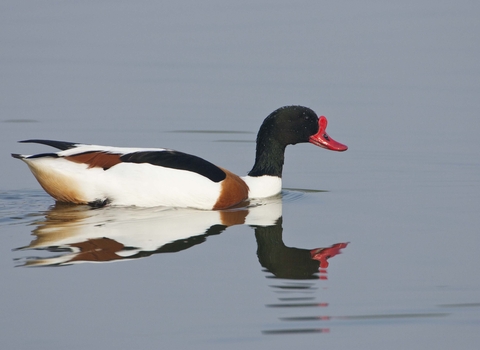
©Guy Edwardes/2020VISION
Shelduck
One of our largest ducks, the shelduck is a handsome creature with a dark green head, red bill and chestnut-brown band across its white body. Look out for it around most of our coastline, particularly in winter.
Scientific name
Tadorna tadornaWhen to see
January to DecemberSpecies information
Category
Statistics
Length: 58-64cmWingspan: 1.1m
Weight: 1-1.2kg
Average lifespan: 10 years
Classified in the UK as Amber under the Birds of Conservation Concern 5: the Red List for Birds (2021).
Habitats
About
The shelduck is one of our largest ducks, growing as big as some geese. It is mainly coastal, feeding on small invertebrates that it finds in the mud of estuaries and sandy beaches. It has spread inland, however, as flooded gravel pits with sandy shores and gravel banks provide a perfect feeding ground.How to identify
The shelduck is a big, white duck, with a dark green head, bright red bill, orangey-brown band around the breast, and black patches on the back and wings.Distribution
Common around much of the UK's coastline, but can also be found inland in small numbers on gravel pits and reservoirs.Did you know?
The shelduck nests underground in old rabbit burrows, in tree holes or in haystacks. During the 19th century, it was persecuted for this habit in certain areas as it competed with rabbits which were food for many people.Watch
Shelduck (https://vimeo.com/452225615/758df3ce4a)
Shelduck by Tom Hibbert
